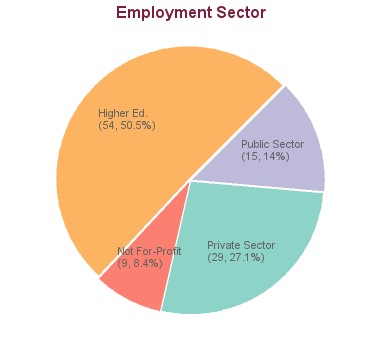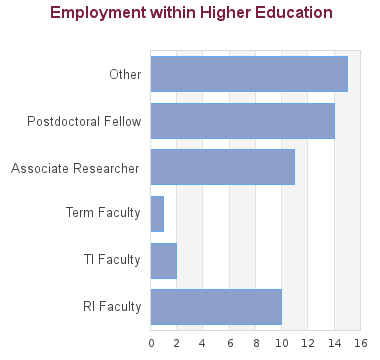
Kevin Johns
Job Title
Medical Science Liaison
Employer
AstraZeneca Canada

Review details about the recently announced changes to study and work permits that apply to master’s and doctoral degree students. Read more
Experimental Medicine is the study of the pathogenesis and treatment of disease. Modern experimental medicine represents a rapidly growing body of knowledge involving the determination of diseases processes and the development of appropriate therapies.
The Experimental Medicine Program is intended for individuals seeking a career in research. The Department of Medicine offers opportunities and facilities for advanced studies in Experimental medicine, leading toward the M.Sc. and Ph.D. degrees. Members of the Department direct research programs in a wide range of basic and clinically relevant areas. There are a variety of special interest areas of national and international stature. Specialties within the Experimental Medicine Program include: Cardiology, Endocrinology, Gastroenterology, Hematology, Infectious Diseases, Medical Immunology, Medical Oncology, Molecular Biology, Nephrology, Neurology and Respiratory Medicine.
The principal emphasis of this graduate program is training in research. Success at this level is traditionally measured by the preparation and defense of a thesis. Course work is required of all students, based on the background of the candidate and the degree program. The work of each Ph.D. candidate will be supervised by a candidate’s Committee consisting of not fewer than three members. These may include faculty members from a department other than that in which the candidate is writing the thesis.
Applicants are not required to have a supervisor at the time of applying, but the application won't be reviewed until they secure a supervisor and all required paperwork is submitted.
The Faculty of Graduate and Postdoctoral Studies establishes the minimum admission requirements common to all applicants, usually a minimum overall average in the B+ range (76% at UBC). The graduate program that you are applying to may have additional requirements. Please review the specific requirements for applicants with credentials from institutions in:
Each program may set higher academic minimum requirements. Please review the program website carefully to understand the program requirements. Meeting the minimum requirements does not guarantee admission as it is a competitive process.
Applicants from a university outside Canada in which English is not the primary language of instruction must provide results of an English language proficiency examination as part of their application. Tests must have been taken within the last 24 months at the time of submission of your application.
Minimum requirements for the two most common English language proficiency tests to apply to this program are listed below:
Overall score requirement: 96
Reading
22
Writing
22
Speaking
22
Listening
22
Overall score requirement: 7.0
Reading
7.0
Writing
7.0
Speaking
7.0
Listening
7.0
Some programs require additional test scores such as the Graduate Record Examination (GRE) or the Graduate Management Test (GMAT). The requirements for this program are:
The GRE is not required.
For admission to the PhD program in Experimental Medicine, the student must hold a M.Sc. degree in life sciences, biology, zoology, biochemistry, or related disciplines.
Deadline to submit online application. No changes can be made to the application after submission.
Transcript DeadlineDeadline to upload scans of official transcripts through the applicant portal in support of a submitted application. Information for accessing the applicant portal will be provided after submitting an online application for admission.
Referee DeadlineDeadline for the referees identified in the application for admission to submit references. See Letters of Reference for more information.
All applicants have to submit transcripts from all past post-secondary study. Document submission requirements depend on whether your institution of study is within Canada or outside of Canada.
A minimum of three references are required for application to graduate programs at UBC. References should be requested from individuals who are prepared to provide a report on your academic ability and qualifications.
Many programs require a statement of interest, sometimes called a "statement of intent", "description of research interests" or something similar.
Students in research-based programs usually require a faculty member to function as their thesis supervisor. Please follow the instructions provided by each program whether applicants should contact faculty members.
Permanent Residents of Canada must provide a clear photocopy of both sides of the Permanent Resident card.
All applicants must complete an online application form and pay the application fee to be considered for admission to UBC.
| Fees | Canadian Citizen / Permanent Resident / Refugee / Diplomat | International |
|---|---|---|
| Application Fee | $116.25 | $168.25 |
| Tuition * | ||
| Installments per year | 3 | 3 |
| Tuition per installment | $1,875.34 | $3,294.66 |
| Tuition per year (plus annual increase, usually 2%-5%) | $5,626.02 | $9,883.98 |
| Int. Tuition Award (ITA) per year (if eligible) | $3,200.00 (-) | |
| Other Fees and Costs | ||
| Student Fees (yearly) | $1,144.10 (approx.) | |
| Costs of living | Estimate your costs of living with our interactive tool in order to start developing a financial plan for your graduate studies. | |
Applicants to UBC have access to a variety of funding options, including merit-based (i.e. based on your academic performance) and need-based (i.e. based on your financial situation) opportunities.
Effective September 2024, successful applicants who will start the Ph.D. program and who do not hold a major scholarship, will receive a minimum stipend of $30,000 per year from their supervisor.
All applicants are encouraged to review the awards listing to identify potential opportunities to fund their graduate education. The database lists merit-based scholarships and awards and allows for filtering by various criteria, such as domestic vs. international or degree level.
Many professors are able to provide Research Assistantships (GRA) from their research grants to support full-time graduate students studying under their supervision. The duties constitute part of the student's graduate degree requirements. A Graduate Research Assistantship is considered a form of fellowship for a period of graduate study and is therefore not covered by a collective agreement. Stipends vary widely, and are dependent on the field of study and the type of research grant from which the assistantship is being funded.
Graduate programs may have Teaching Assistantships available for registered full-time graduate students. Full teaching assistantships involve 12 hours work per week in preparation, lecturing, or laboratory instruction although many graduate programs offer partial TA appointments at less than 12 hours per week. Teaching assistantship rates are set by collective bargaining between the University and the Teaching Assistants' Union.
Academic Assistantships are employment opportunities to perform work that is relevant to the university or to an individual faculty member, but not to support the student’s graduate research and thesis. Wages are considered regular earnings and when paid monthly, include vacation pay.
Canadian and US applicants may qualify for governmental loans to finance their studies. Please review eligibility and types of loans.
All students may be able to access private sector or bank loans.
Many foreign governments provide support to their citizens in pursuing education abroad. International applicants should check the various governmental resources in their home country, such as the Department of Education, for available scholarships.
The possibility to pursue work to supplement income may depend on the demands the program has on students. It should be carefully weighed if work leads to prolonged program durations or whether work placements can be meaningfully embedded into a program.
International students enrolled as full-time students with a valid study permit can work on campus for unlimited hours and work off-campus for no more than 24 hours a week during academic sessions.
A good starting point to explore student jobs is the UBC Work Learn program or a Co-Op placement.
Students with taxable income in Canada may be able to claim federal or provincial tax credits.
Canadian residents with RRSP accounts may be able to use the Lifelong Learning Plan (LLP) which allows students to withdraw amounts from their registered retirement savings plan (RRSPs) to finance full-time training or education for themselves or their partner.
Please review Filing taxes in Canada on the student services website for more information.
Applicants have access to the cost estimator to develop a financial plan that takes into account various income sources and expenses.
124 students graduated between 2005 and 2013: 1 graduate is seeking employment; for 16 we have no data (based on research conducted between Feb-May 2016). For the remaining 107 graduates:


These statistics show data for the Doctor of Philosophy in Experimental Medicine (PhD). Data are separated for each degree program combination. You may view data for other degree options in the respective program profile.
| 2023 | 2022 | 2021 | 2020 | 2019 | |
|---|---|---|---|---|---|
| Applications | 15 | 20 | 36 | 26 | 32 |
| Offers | 7 | 11 | 20 | 8 | 15 |
| New Registrations | 6 | 10 | 13 | 7 | 14 |
| Total Enrolment | 98 | 85 | 94 | 114 | 120 |
Students in research-based programs usually require a faculty member to function as their thesis supervisor. Please follow the instructions provided by each program whether applicants should contact faculty members.
These videos contain some general advice from faculty across UBC on finding and reaching out to a supervisor. They are not program specific.
| Year | Citation |
|---|---|
| 2016 | Dr. Huang studied novel molecular markers for skin lymphoma. She demonstrated the clinical value and functional importance of a gene, TOX, in the most common skin lymphoma. Her research assists us in understanding the cause of this disease, improving management of patients, and developing novel therapies for this skin cancer. |
| 2015 | Dr. Sze investigated the role of bacterial communities in the lung and how they can potentially impact disease progression in Chronic Obstructive Pulmonary Disease. Specifically, he studied how these bacterial communities influence and drive immune and inflammatory processes, and identified specific bacteria that could be targeted by those processes. |
| 2015 | Leishmania are small parasites that are transmitted to humans by sand flies and can cause severe disease. Dr. Lambertz examined how leishmania cause disease and can shut down the host's immune response. Her research advanced our understanding of how parasites communicate with humans and may aid in development of new drugs to treat leishmania infection. |
| 2015 | Dr. Ryz studied the ways in which vitamin D affects the gut during colitis. Her novel research showed that high levels of vitamin D can negatively affect the intestinal immune system, increasing the risk of infection by dangerous gut bacteria. Her findings may help patients with Inflammatory Bowel Disease, who are at high risk of bacterial infection. |
| 2015 | Dr. MacDonald completed her doctoral program in the field of Experimental Medicine. She developed a new therapy to prevent transplant rejection by genetically modifying the immune system to protect transplanted tissue. This research could allow wait-listed patients to receive transplants sooner and reduce their need for immunosuppressive drugs. |
| 2015 | Obesity is associated with chronic inflammation, which greatly increases the risk of various health problems such as type 2 diabetes. Why does obesity-associated inflammation develop? Is there a way to reverse it? Dr. Han's research shows that a type of immune cells called regulatory T cells plays an important part in answering these questions. |
| 2015 | Using systems biology approaches, Dr. Wee investigated the molecular basis of lower immune responses against infection in newborns and adults, sixty-five years and older. This study sheds light on the molecular pathways that influence age-dependent differences in immune systems, which may result in differences in the clinical outcome of infection. |
| 2015 | Dr. Triscott's doctoral studies focused on the development of new methods to improve the treatment of high-grade brain tumors. Her work resulted in the identification of molecular targets that drive tumor formation. This work highlights the potential for repurposing clinically available drugs to prevent the growth of aggressive brain tumors. |
| 2015 | Dr. Petersen examined psycho-social, clinical, and risk profiles of severely mentally ill individuals who were relocated as a result of the closure of BC's Riverview Hospital. Longitudinal data demonstrated positive changes in quality of life and independent living skills. In addition, there was no evidence that individuals in this study became homeless. |
| 2015 | Dr. Yao completed her doctoral program in Experimental Medicine. She studied how cellular stress signals modulate the crosstalk between innate and adaptive immune responses. These comprehensive studies showed for the first time that a subtype of CD4 regulatory cells, named Tr1 cells can inhibit responses to cellular stress signals. |
Experimental Medicine offers research opportunities in the following specialties: cardiology, cancer biology, dermatology, gastroenterology, hematology/oncology, infectious diseases, molecular medicine, nephrology, neurology, and respiratory medicine. All these fields can involve patients and/or experimental animal models.
Departments/Programs may update graduate degree program details through the Faculty & Staff portal. To update contact details for application inquiries, please use this form.

Take a break from studying with opportunities at your fingertips. Whether you want to settle down in a café or take your research outdoors, we have a place for you.